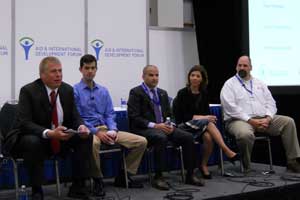
Meet…Paul Margie, Télécoms Sans Frontières
U.S. Representative, humanitarian worker, lawyer, board member, family man
Paul Margie wears many hats, but humanitarian was not one he originally intended. Studying English Literature at university, his intention was to get a doctorate and go into teaching. It was the early days of the web, and during a stint at Oxford University he "got more and more into the internet and decided I wanted to get into that from a policy point of view."
His inspiration was Lawrence Lessig, his advisor at law school and an ardent proponent of internet freedoms. "Working with him, I thought, ‘This is what I want to do.'"

Paul's work at the UN Foundation gave him a much broader view of how ICT was used in a humanitarian context. "They hired me to start up their partnership with the Vodafone Foundation and they allowed us a whole year to talk to everyone within the UN system and NGOs about how they were using ICT; everything you can imagine," he says. "We whittled this down and identified the two best opportunities: emergency response and health and decided to advance the use of ICT in those areas; that's how I came to work with Télécoms Sans Frontières (TSF)."
It was an immersive and captivating introduction into the world of humanitarianism, and one that has sparked an enduring passion. It also highlighted the importance of partnerships and personal relationships.
"It became clear to me during the development of the IT Emergency Management Training in Pisa, that 90 percent of what's needed to succeed in an emergency work is preparedness before the emergency," says Paul. "The people who work together in the field need to train together and get to know each other before the crisis. TSF and the World Food Programme (WFP) understand this, and other organizations are starting to recognize it; including governments and private companies."
Following the birth of his second child, Paul cut back on the traveling to spend more time with his family and rejoined the private sector, but on one condition: "That I got free time to volunteer with TSF and help out with humanitarian work. They're very tolerant. They let me disappear."
Paul now works in a private legal practice, representing clients such as Google, Apple and Sprint. But he's also the US Representative for TSF, sits on the board of DataDyne and still manages to find time to travel to the field to provide training on VSAT installation, BGANs and how to coordinate with the UN and the Emergency Telecommunications Cluster (ETC).
Paul's position straddling the legal, technology and humanitarian sectors gives him a unique insight into the changes currently happening, most notably the empowerment of beneficiaries through technology.
"One huge difference is that the population, our customers, are now equipped with powerful mobile computers in emergencies and they expect to be able to use them," he says. "So our job is not to come in with a purpose built system that works only for us. We have to understand what the population needs and help them do what they want with their own equipment." The change has been so rapid and so significant, he suggests, that it has fundamentally altered the humanitarian context. "Populations do not play a passive role, and we are still figuring out what that means."
Despite his multi-faceted career, Paul is admirably modest about his work, preferring to defer praise to those in the field. "I'm awestruck by those guys who get assignments in places like rural Sudan, how they balance family and work life."
But it's this perspective that provides his motivation. "If I can help those guys in the field be the tip of the spear, doing what I do, then I'm proud of that."
While legal work presents the valuable opportunity to fundamentally influence the deployment of ICT in emergencies, a return to full-time humanitarian work remains on the cards.
"I love law work, it's intellectually challenging," says Paul. "But when the kids are in college, maybe I'll move back into humanitarian work full-time. I hope I have that opportunity someday."